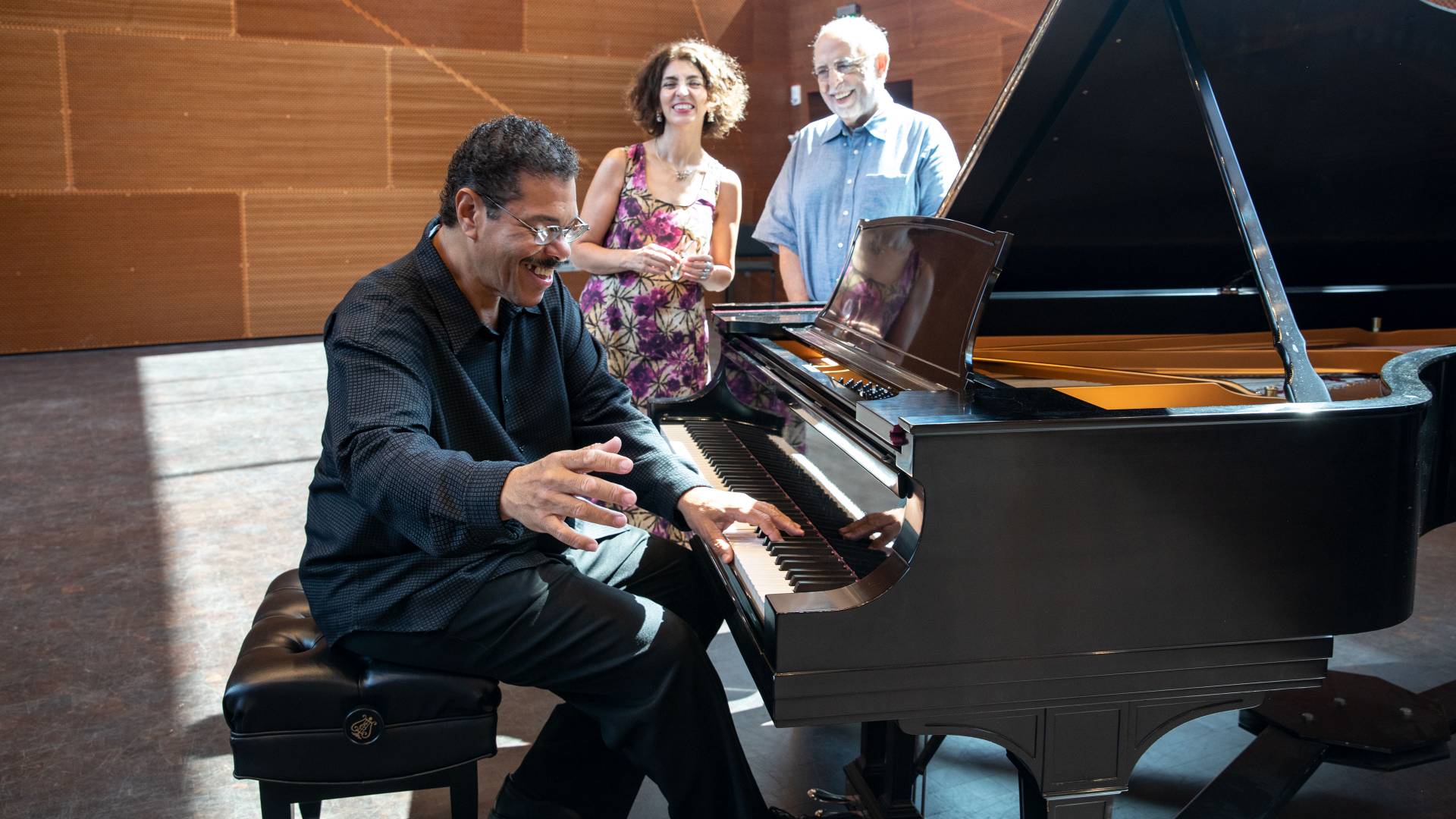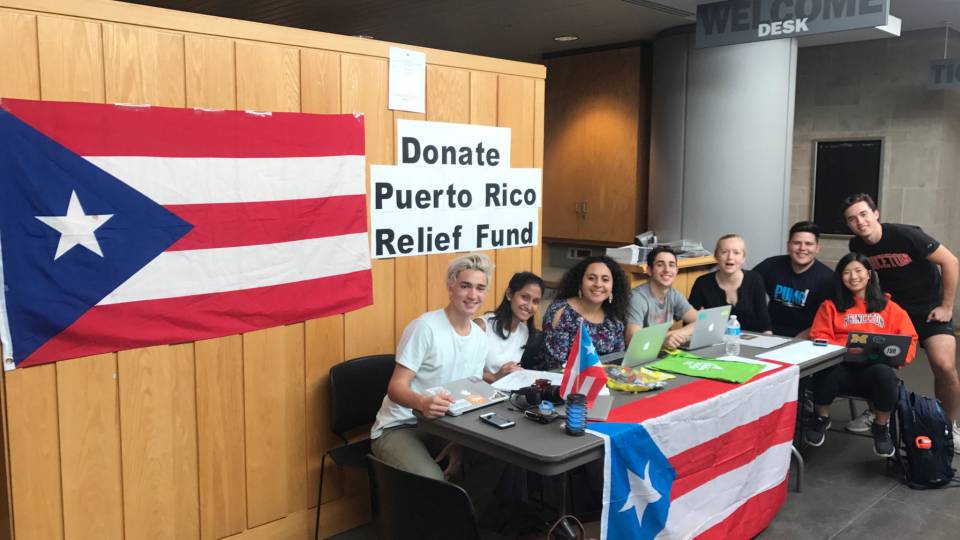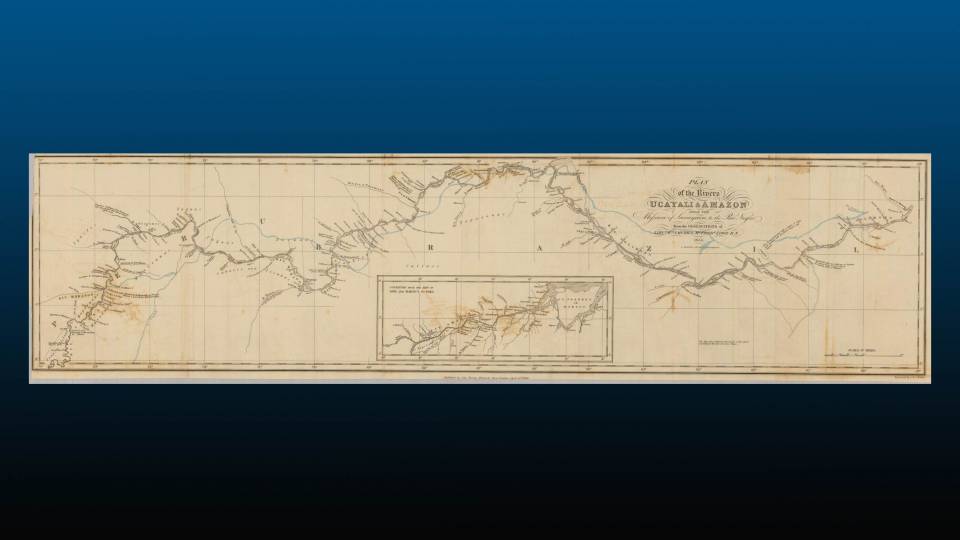A summer program at Princeton University is supporting 13 scholars, students and artists from Puerto Rico affected by the catastrophic aftermath of hurricanes Irma and Maria that hit the Caribbean last September. The program enables the visitors to continue their work at Princeton on a temporary basis. At the piano in the New Music Building is composer Alfonso Fuentes Colón, an associate professor at the Conservatory of Music of Puerto Rico, playing an excerpt from his concerto "Oda para los árboles caídos (Ode to the fallen trees)." Princeton’s Gabriela Nouzeilles, the Emory L. Ford Professor of Spanish and director of the Program in Latin American Studies, and Arcadio Díaz-Quiñones, the Emory L. Ford Professor of Spanish, Emeritus, look on.
On Sept. 20, 2017, Hurricane Maria slammed into the Caribbean, soon after Hurricane Irma. Puerto Rico was one of the hardest-hit islands. Maria destroyed thousands of homes and the island's power grid, leaving millions without electricity — reportedly the longest blackout in U.S. history. While the recovery continues and the death toll is still being debated, Princeton University is serving as a haven for some Puerto Rican scholars and artists whose work and lives the storms disrupted.
Two days before Hurricane Maria struck, Marla Perez-Lugo, a professor of sociology at the University of Puerto Rico-Mayagüez (UPRM), and her husband, Cecilio Ortiz Garcia, an associate professor of political science at UPRM — who research energy policy and justice issues — had just arrived at a conference at Columbia University. They turned around and got one of the last flights back to Puerto Rico, with one day to prepare for the storm.
"Our world was turned upside down," said Perez-Lugo. "The impact was long — more than 20 hours — and our house flooded not because of rising waters but due to the wind forcing rain through the concrete walls."
The next day they drove to Aguadilla, where her mother lives. There was no electricity or cellphone connection. "The houses, the trees, everything was gone," Perez-Lugo said. "The landscape looked like a bomb went off. Everything was burnt, scrapped, destroyed. Then our lives changed completely. Our days went by fulfilling basic needs such as fetching potable water from a fire hydrant in front of city hall or standing in line for six to eight hours just to get some gasoline."
Perez-Lugo, Ortiz Garcia and Javier Nieves Torres, one of their undergraduate students, are among a group of 13 scholars, artists and students visiting Princeton University this summer as part of the Visiting Scholars and Artists from Puerto Rico (VISAPUR) program. The fellows span a range of fields including energy and the environment, law, history and the arts.
The program, sponsored and managed by the Program in Latin American Studies (PLAS) and the Office of the Provost, aims to provide relief to scholars, students and artists affected by the catastrophic aftermath of hurricanes Irma and Maria by enabling them to continue their work at Princeton on a temporary basis.
"As the University's informal motto declares — 'In the nation’s service and the service of humanity' — one of the fundamental goals of Princeton's mission is service," said Gabriela Nouzeilles, the Emory L. Ford Professor of Spanish and director of the Program in Latin American Studies (PLAS). "Service can be defined in different ways and includes ... responding to current crises and catastrophes that affect the world with meaningful assistance and support in the realm of work we know best, that is, research and scholarship.
"The impact of hurricanes Irma and Maria on Puerto Rican universities, art institutions and libraries has been devastating, and most Puerto Rican scholars, artists and students have been unable to do research, write or teach," she said, noting that in addition to the provost’s office, academic and administrative offices across campus have helped organize VISAPUR.
The program is among several initiatives stemming from the Princeton Task Force on Puerto Rico, an informal working group of about 10-15 Princeton faculty and staff members who met monthly during the past year to discuss efforts to assist Puerto Rico and, in particular, how to help Princeton’s academic counterparts on the island. The task force is part of the University community's response to the devastation in post-hurricane Puerto Rico.
Nouzeilles said Arcadio Díaz-Quiñones, the Emory L. Ford Professor of Spanish, Emeritus, and former PLAS director, deserves "special thanks for being the institutional engine and ethical force behind Princeton's overall response to the Puerto Rican catastrophe."
“Princeton is pleased to be hosting faculty members, artists and students from Puerto Rico, and enabling them to pursue vital research and engagement on our campus," said Aly Kassam-Remtulla, assistant provost. "The presence of the VISAPUR scholars enhances our ties to Puerto Rico and enriches our understanding of the complex sociopolitical context of the island.”
Nouzeilles said the program provides "the opportunity to imagine opportunities for future collaborations and teaching projects between the University and scholars and institutions in Puerto Rico in areas ranging from alternative energy and policy, property law, housing, poverty and racial discrimination to migration, photography, dance and music."
Many of the visiting scholars did not know one another before coming to Princeton. Through meet-and-greet workshops, they are sharing their research, which may also lead to interdisciplinary collaboration once they return to Puerto Rico. They are meeting Princeton faculty and staff members from a range of academic and administrative units, including the departments of anthropology, economics, history, sociology, and Spanish and Portuguese; Program in American Studies; Andlinger Center for Energy and the Environment; School of Architecture; School of Engineering and Applied Science; Princeton Environmental Institute; Princeton Mellon Initiative in Architecture, Urbanism and the Humanities; Pace Center for Civic Engagement; and the Princeton University Library.
A critical element of the program is that each scholar's work will have a positive impact, directly or indirectly, on post-hurricane Puerto Rico.
Nouzeilles said criteria for the program included the quality and ambition of the research or artistic proposal and its relevance for the current situation on the island (efforts to understand the environmental, social, political and economic impact of the hurricanes; potential to provide recommendations to provide solutions; and, for the artists, efforts to make sense of or produce insights on the catastrophe through artistic means). There were approximately 70 applicants.
Below is a glimpse into the work of the fellows in three areas followed by a list of the other visitors. See the PLAS website for expanded bios of all the scholars and their dates of stay at Princeton.
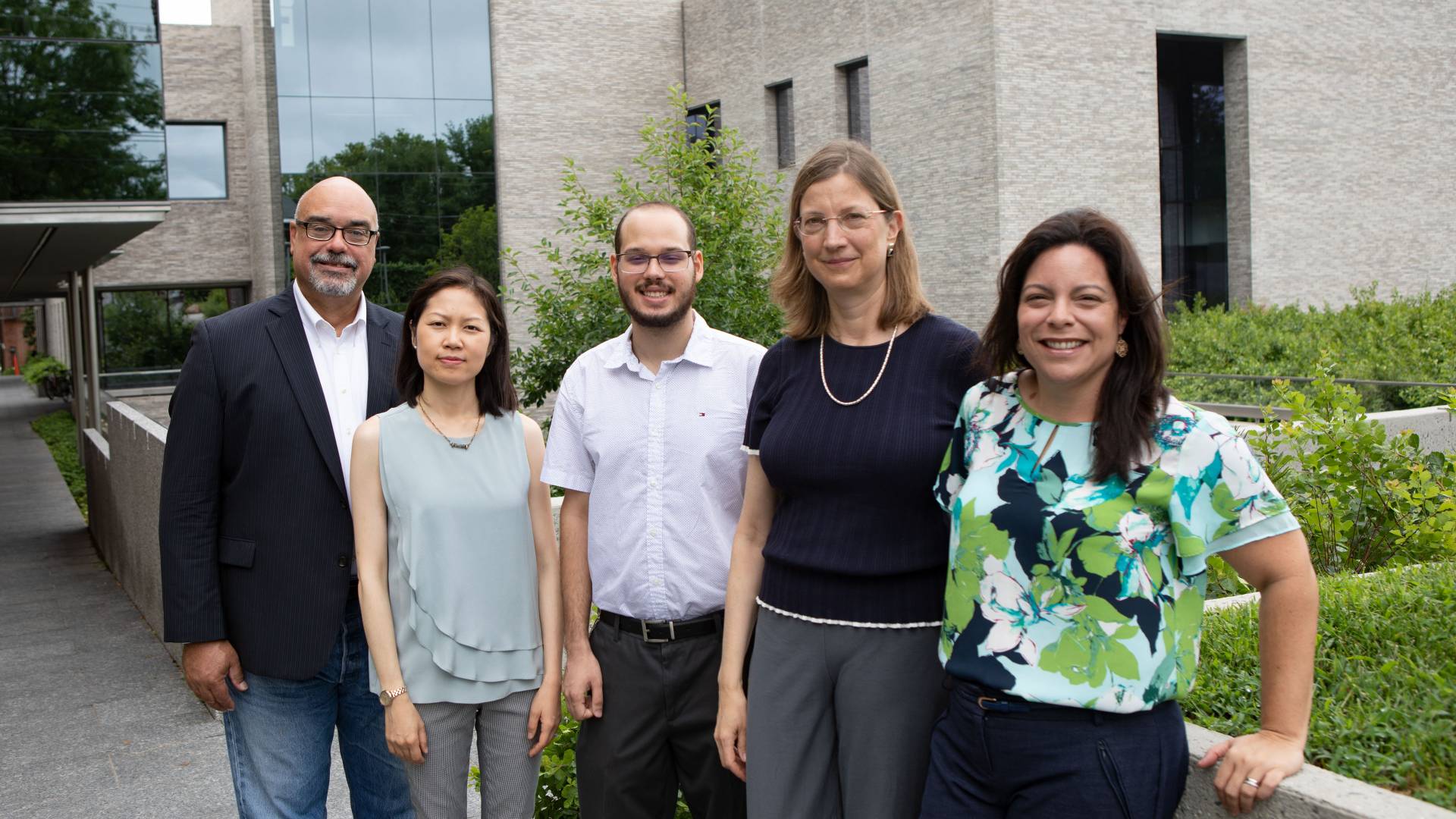
Cecilio Ortiz Garcia (left), associate professor of political science at the University of Puerto Rico-Mayagüez (UPRM); Marla Perez-Lugo (far right), professor of sociology at UPRM; and one of their undergraduate students, Javier Nieves Torres (center) — who are working on a model of a sustainable energy market — visit with Princeton faculty members Ning Lin (second from left), associate professor of civil and environmental engineering; and Denise Mauzerall (second from right), professor of civil and environmental engineering and public and international affairs, in front of the Andlinger Center for Energy and the Environment.
Modeling a sustainable energy market
Ortiz Garcia, Perez-Lugo and Nieves Torres are working on the National Science Foundation’s CRISP (Critical Resilient Interdependent Infrastructure Systems and Processes) “Open Access Smart Grid Project" by modeling what a sustainable energy market would look like, taking the case of Puerto Rico as an example. They are on the Princeton campus from July 15 to Aug. 11.
Perez-Lugo said they have integrated knowledge from computer engineering, electrical engineering, meteorology, community psychology, public administration and environmental sociology to develop the model.
"We are proposing a shift from a highly concentrated and centralized electric system (a few big plants) towards a more decentralized model in which households and organizations can become 'pro-sumers' (producers and consumers of electricity) with a virtual 'space' to engage in energy transactions — like an eBay or Uber for energy services," Perez-Lugo said.
While the technology exists for such a system in Puerto Rico, there are social, political and economic impediments, she said. At Princeton, they are using NVivo software to finalize the analysis of 31 in-depth interviews with stakeholders to help address those issues.
She said their time at Princeton is allowing them to "detach ourselves from the hectic conditions of the university back home to focus on the analysis of that data."
Perez-Lugo said they have enjoyed meeting Princeton faculty members including Denise Mauzerall, professor of civil and environmental engineering and public and international affairs, Woodrow Wilson School, whose research focus includes air pollution and health, and Ning Lin, associate professor of civil and environmental engineering, whose research focus includes storm risks and hazards. They have also had in-depth discussions with Elke Weber, the Gerhard R. Andlinger Professor in Energy and the Environment, and professor of psychology and public affairs, Woodrow Wilson School, who studies how the science of human behavior can inform policies that encourage people to make good choices for the environment.
They have used resources at the Princeton University Library to start developing a pictorial book on Puerto Rico's energy transitions from 1898 to the present. "I think that will be a good contribution not only to the literature but also to the historical approach to Puerto Rico's development," Perez-Lugo said.
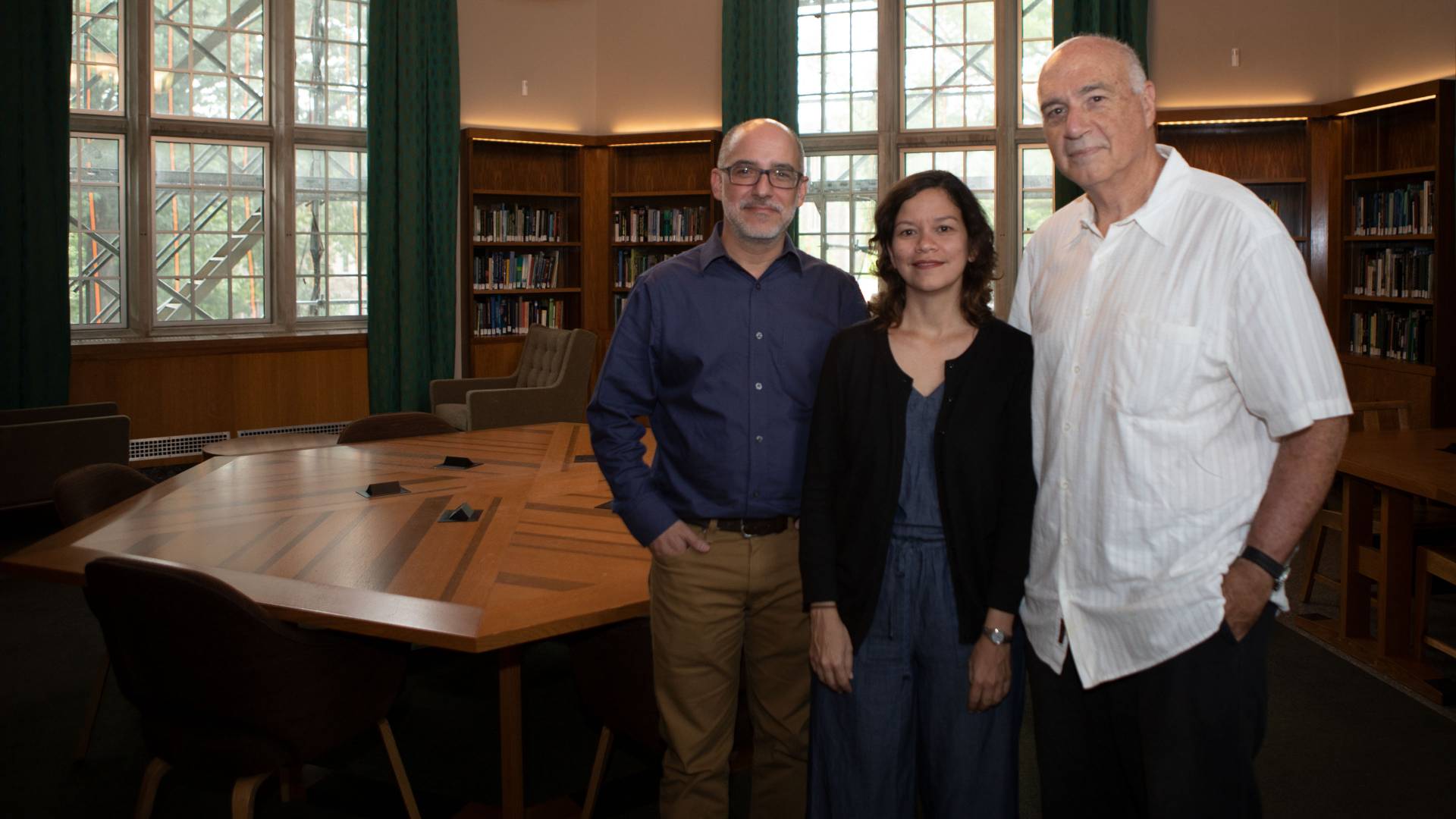
Érika Fontánez-Torres (center), a professor at the University of Puerto Rico Law School, is researching the development of the concept of property in Puerto Rico. She visits with Fernando Acosta-Rodríguez (left), librarian for Latin American studies, Latino studies and Iberian Peninsular studies, Princeton University Library, and Hendrik "Dirk" Hartog (right), the Class of 1921 Bicentennial Professor in the History of American Law and Liberty, in the Dulles Reading Room in Firestone Library.
Examining the concept of property
Érika Fontánez-Torres, a professor at the University of Puerto Rico Law School, is using her time at Princeton to work on a research project that examines the development of the concept of property in Puerto Rico. She will be at Princeton from July 9 to Aug. 4.
"Puerto Rico faces serious problems related to housing, the exclusion and gentrification of the city, and land speculation," Fontánez-Torres said. "This situation has deepened conditions of great inequality in the access to goods (private and public). Specifically, after Hurricane Maria, thousands of people have not received help because they do not have property titles, or either have completely lost their homes or are at risk of being evicted."
The main objective of Fontánez-Torres' research, she said, “is to provide a historical, political and legal overview of property as a concept that has been the subject of intense debate and has shaped power relations.”
Themes of dispossession and the disappearance of public goods are central to her work. "I hope that my work contributes to a critical perspective into these issues that can help us understand the roots of the problems, to conceive innovative alternatives and to impact public discussion and public policies with respect to these serious problems," Fontánez-Torres said. "My goal is that the work and the knowledge I generate can ... help to improve the quality of life for all."
She works from an interdisciplinary approach and said she has enjoyed meeting Princeton faculty members including Hendrik "Dirk" Hartog, the Class of 1921 Bicentennial Professor in the History of American Law and Liberty.
"Professor Hartog and I had the opportunity of discussing contemporary approaches to property law, its shortcomings and its new tendencies, including the works of critical legal theory scholars," she said.
They also exchanged book recommendations and explored prospective research plans. Fontánez-Torres said she is looking forward to reading Hartog's 2018 book, "The Trouble with Minna: A Case of Slavery & Emancipation in the Antebellum North." "His approach toward the subject of law and legal institutions is brilliant," she said.
Fontánez-Torres is also spending time with members of Princeton's Eviction Lab, helmed by Matthew Desmond, professor of sociology, whose 2016 book, "Evicted: Poverty and Profit in the American City," won the 2017 Pulitzer Prize in General Nonfiction.
Fontánez-Torres said the materials in Princeton University Library's Latin American collections have been "very valuable" to her research project, noting that she has been able to access new publications on the topic of property, as well as governmental and public policy documents on Puerto Rico from the first half of the 20th century.
Working with Fernando Acosta-Rodríguez, Princeton's librarian for Latin American studies, Latino studies and Iberian Peninsular studies (who is from Puerto Rico), Fontánez-Torres has also gained access to bibliographic sources from other libraries, which "has provided a great opportunity to develop my ongoing research," she said.
The main library at the University of Puerto Rico was extensively damaged during the hurricane, and many areas and collections are inaccessible due to mold. Acosta-Rodríguez said there is discussion about helping the University of Puerto Rico to digitize and preserve some of its rare materials.
Rebuilding spirit and morale through the arts
Alfonso Fuentes Colón, a composer, improvisational pianist, poet and an associate professor at the Conservatory of Music of Puerto Rico, waited out Hurricane Maria in his mother-in-law's house in Hato Rey, San Juan, with his wife and children. Their own house in Trujillo Alto sustained damage and they haven't been able to return.
"The first thing I saw immediately after the hurricane was that my mother in-law's front neighbor’s house was totally without a roof," he said. "Luckily there was no one inside. Later on, from the second floor, I observed dozens of houses with no roofs in the distance, and lots of debris everywhere. As there was no communication for several days, we were not aware of how much Maria had devastated the island."
He saw thousands of fallen trees. At Princeton, Fuentes Colón is working on the orchestration of the first movement of his concerto for clarinet and symphony orchestra, "Oda para los árboles caídos (Ode to the fallen trees)."
He had already composed a draft before the hurricane — for his friend and clarinetist Oskar Espina-Ruiz, who was set to premiere it with the Symphony Orchestra of Zhejiang Conservatory of Music in China, as part of an artistic residence he and Espina-Ruiz had scheduled for April this year — but the hurricane changed everything.
"After Maria, I abandoned that draft because my emotions were altered, and made a brand new draft for the present work in its clarinet and piano version," Fuentes Colón said.
Fuentes said he is grateful for the opportunity to work in a studio in the New Music Building at the Lewis Arts complex. "My home composition studio was affected by the winds and waters of Maria, my studio-classroom’s air conditioning remains broken down — and the Conservatory of Music is closed in the summer."
He describes the clarinet concerto as a message of hope.
"This work is a positive example of musical creation in times of crisis. [Its] message [is] that the fallen trees will sprout, which is a hopeful subject that deserves an educational discussion with youth and children. Just as our native mahogany and oak trees, Puerto Ricans are resilient and our spirit is growing branches of solidarity," he said.
Fuentes Colón said he is grateful to PLAS and the University for the invitation. "I appreciate the smile and kindness of those who work here. I am making new friends," he said. He is on the Princeton campus from July 22 to Aug. 4.
Scholars and artists
Laura Bravo López is a professor in the Art History Program at the University of Puerto Rico-Río Piedras, where she also is coordinator for faculty initiatives at iINAS, an undergraduate research program at the Office of the Dean of Graduate Studies and Research. At Princeton, she will focus on updating her research on migration and contemporary art in Puerto Rico after Hurricane Maria, studying the projects of Princeton's interdisciplinary research community "Migration: People and Culture Across Borders." Aug. 5-18.
Manuel Clavell Carrasquillo is a lecturer in the Metropolitan University of Puerto Rico, where he teaches ethics and communication, advanced Spanish composition, and Spanish speech and oral communication. He also works as a lawyer and independent journalist. His project is on the intersections of photography and the chronicle in the digital age. Aug. 1-15.
José Caraballo-Cueto is an assistant professor at the Institute for Interdisciplinary Research at the University of Puerto Rico-Cayey, director of the Census Information Center of Puerto Rico, president of the Puerto Rico Association of Economists and a regular contributor to the research platform “Econolatin,” managed by the Autonomous University of Madrid. His work at Princeton aims to monitor the effects of racial discrimination on health and socioeconomic status among Puerto Ricans. July 22-Aug. 4.
Jorge Lizardi-Pollock is a professor of history, theory and research at the University of Puerto Rico School of Architecture where he founded the Interdisciplinary Center for Research on Urbanism and Environmental Design. His work at Princeton is on the preservation of places of memory within contexts of tragedy. July 15-Aug. 11.
Errol Montes-Pizarro is a professor of mathematics at the Institute of Interdisciplinary Research at the University of Puerto Rico-Cayey. Since 2001, he has produced and hosted the radio program Rumba Africana for Radio Universidad de Puerto Rico and aired in Barranquilla, Colombia. At Princeton, he is working on a project that aims to document and analyze African influences on Caribbean traditions of string instruments (chordophones). July 22-Aug. 4.
Nibia Pastrana Santiago co-directs the LA ESPECTACULAR Artists Residency with Gisela Rosario Ramos in Santurce, a district of San Juan. She is the academic coordinator of the dance program at Universidad del Sagrado Corazón & Escuela de Danza 21. At Princeton, she will work on her essay "Panorama Imposible: Baile, Resistencia y Explosión (Impossible Panorama: Dance, Resistance and Explosion)." Aug. 19-Sept. 1.
Herminio Rodríguez is a professional commercial and conceptual photographer in San Juan and a photography professor at Inter-American University of Puerto Rico. At Princeton, he will continue his work on a long-term photography documentary project about the Santiago Apostol (St. James) procession in Loíza, Puerto Rico. Aug. 5-18.
Students
Donald Escudero Rivera is a master's degree candidate in cultural management and administration at the University of Puerto Rico-Río Piedras. At Princeton, he will assist Bravo López, updating research on migration and contemporary art in Puerto Rico after Hurricane Maria. Aug. 5-18.
Javier Nieves Torres is an undergraduate student at the University of Puerto Rico-Mayagüez, where he is completing his final year, with a concentration in history and a gender studies minor. His research interests include the transdisciplinary study of energy governance and the social acceptance of energy transitions. He is working with Perez-Lugo and Ortiz Garcia on the NSF CRISP “Open Access Smart Grid Project.” July 15-Aug. 11.
